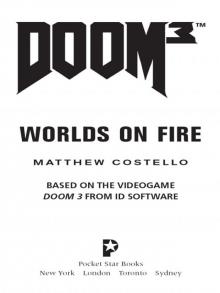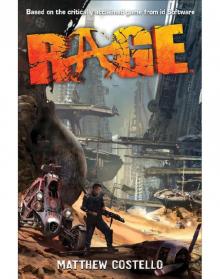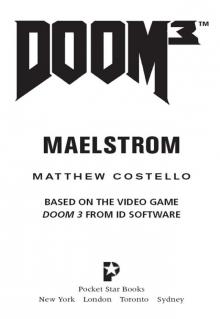- Home
- Matthew Costello
Doom 3™: Worlds on Fire
Doom 3™: Worlds on Fire Read online
NOT A MARINE, NOT A SCIENTIST,
NOTHING HUMAN.
The head looked to be encased in a metal jacket, but as this thing moved, the metal-like skin of its face moved…. shifted…
But eyes…Does it have eyes?Those dozens of whitish things—were they eyes? Though it certainly had a mouth. No doubting that. And the legs—massive, ending in giant wedge-shaped claw feet.
It raised its hands. At least it didn’t have any weapons. Still, those claws looked nasty.
An alien,Kane thought.We have aliens here?
But even as the thing took a towering step close to him, Kane doubted that.
Aliens. Arriving in spaceships? Was that what was happening here?
He raised the shotgun. Whatever the hell it was, Kane was about to blow it off the walkway when he felt something close around his head.
Peripheral vision told him the bad news: another one of those things had appeared on the walkway behind him.
And now it held Kane’s unhelmeted head firmly in its massive hand, squeezing tight.
Pocket Star Books
A Division of Simon & Schuster, Inc.
1230 Avenue of the Americas
New York, NY 10020
This book is a work of fiction. Names, characters, places, and incidents either are products of the author’s imagination or are used fictitiously. Any resemblance to actual events or locales or persons, living or dead, is entirely coincidental.
Copyright © 2008 by id Software, Inc. All Rights Reserved. DOOM and ID are registered trademarks of Id Software, Inc. in the United States and/or other countries.
All rights reserved, including the right to reproduce this book or portions thereof in any form whatsoever. For information address Pocket Books Subsidiary Rights Department, 1230 Avenue of the Americas, New York, NY 10020
POCKET STAR BOOKS and colophon are registered trademarks of Simon & Schuster, Inc.
ISBN-13: 978-1-4391-0010-3
ISBN-10: 1-4391-0010-1
Visit us on the World Wide Web:
http://www.SimonSays.com
To Christopher Golden
Good friend and fellow writer—
and my second favorite big guy
from Skull Island…
CONTENTS
ONE2144
1
2
3
4
5
6
7
8
9
10
11
12
13
14
TWO2145
15
16
17
18
19
20
21
22
23
24
25
26
27
28
THREE2145
29
30
31
32
33
34
35
36
37
38
39
AFTERMATH
40
ABOUT THE AUTHOR
ONE
2144
1
MARS CITY22.697 DEGREES NORTH LATITUDE, 48.222 DEGREES WEST LONGITUDE
IAN KELLIHER WALKED UP TO WHAT LOOKED TObe an enormous portal, the steel plates sealed tight. He tapped it, then turned to the three men following behind him.
“So—what’s on the other side?” he asked.
Two of the men—Elliot Swann, the company lawyer, and Jack Campbell, the head of security—turned to the man in uniform. Medals and colorful bars spoke of experience; three stars indicated a general.
A general in the space marines,Kelliher thought. Less a U.S. government military unit than a Union Aerospace Corporation private security force.
“Mars,” the general replied. “Right now, nothing but a big flat expanse of red dirt and rock.”
Kelliher nodded. He knew the project was behind schedule, even though no one had told him so. Nobody ever told him the truth about the problems. Nobody ever told him anything they thought he didn’t want to hear.
Worst of all, he’d have to go back Earthside and report to his father, the great Tommy Kelliher. Sitting in his castle-like Newport Beach estate, monitored by the best medical help that money could buy, kept alive by drugs and machines that most of the world’s hospitals hadn’t even heard about.
Tommy Kelliher. UAC founder emeritus.
Ian was now the UAC chairman. But as long as the pumps forced air into his father’s lungs, Ian would still have to talk to the man who made UAC the amazingly powerful global business it was today. After all, how many businesses owned an entire planet?
Sure, Mars was being developed as a “joint venture” by the United States government and the UAC, but there was no one on Capitol Hill who didn’t know the truth. Mars would be a UAC operation, and the good old U.S. of A. was merely along for the ride.
Kelliher took a step closer to General Hayden.
“General, my supervisors say that the work out there, connecting the units…that it’s all not going as easily as anticipated.”
Hayden nodded. The man had seen his share of battles—or “skirmishes,” as the government liked to call the never-ending little wars that plagued planet Earth—so he didn’t exactly shrink, or back away a step, but a thin line of sweat broke out on his brow.
“True, there have been difficulties. Some rock formations went much deeper than we thought. The surveys were completely wrong in certain places—”
The other two men stayed quiet. Not their job to add heat to this dish.
“But, General,” said Kelliher, “you have done everything you can to help the teams, correct mistakes, to keep us moving forward, yes?”
“Full speed ahead, Ian.”
As if we’re in the navy now.And not in the middle of the largest construction project ever attempted anywhere, let alone in a hostile environment.
Nothing even came close.
“Good. Full speed, as you say. Okay—so now I want tosee. ”
Hayden’s eyes narrowed. “See? See what?”
Another tap of the metal. “Outside. The work, the progress, talk to some my supervisors. And—oh yes—” A pause, so Hayden knew what Kelliher’s real purpose was. “I want to look around Delta. Best tell Betruger.”
Hayden didn’t move.
“And how about we get started now, General?”
Hayden nodded, and then turned and started leading the men away from the unfinished corridor and back to the Administration wing.
“This will all eventually be sealed,” Hayden said, pointing to a series of airlocks.
Kelliher walked up to them. “They don’t look very substantial.”
“As I said…just temporary, until we have completed the other EVA access points,” Hayden replied.
“But perfectly safe, of course.”
Kelliher fired a look at his lawyer. “Joining us, Swann?”
“That’s all right, sir. I can wait—”
“No, really. I insist. Join us,” Kelliher said.
Campbell had already gotten into an EVA suit. A frequent visitor to the Red Planet, Campbell had supervised the implementation of the security systems for the ever-growing Mars City perimeter.
Mars City…
A prosaic name for such a massive undertaking,Kelliher thought. A city on another planet. And while there would be no towering skyscrapers—in fact, much of the base would be underground—it would ultimately rival many of its counterparts back home in size, scope, and—to be sure—ambition.
Big plans were in the works for Mars City. Whe
n it was done, anyway. One of these days.
Kelliher took a suit offered by one of the marines on guard, and immediately felt the weight of it. “We need something this heavy? I thought Martian summer was in full swing.”
Hayden pulled on his suit with another marine helping him. “Last night we got hit with icy dust storms from the poles. And in the morning, it’s always cold. So we need a heavy suit. Should get warmer by lunch.”
Kelliher turned to the climate readout on the side of the EVA ports. Minus 43 degrees. South Pole weather. But here it could get a lot worse, down to minus 250 degrees. And every now and then, at the Martian equator you’d get a balmy 60 degrees Fahrenheit. Short-sleeve weather by Martian standards.
The marine assisting them brought over the lightweight helmets, consisting of a clear headpiece that attached to the compact compressed air tanks fitted into slots in the back.
Not much worse than gearing up for a deep ocean dive,Kelliher thought.
This would be only his second time out on the Martian soil. For some inexplicable reason, he found himself fraught with tension.
The Martian Rover, with its driver in front, sat parked, waiting just outside the airlocks.
“Let’s walk instead,” Kelliher said.
“Right,” Hayden replied, his voice a bit too loud in Kelliher’s helmet. “We can walk.” Kelliher immediately adjusted the controls on his right forearm. Didn’t need the general deafening him.
Even just a few feet away from what would be the Administration Wing, Kelliher could see the immense progress. The Mars City reception area looked nearly done, ready to connect to Admin. And past that—
“That’s Security and Combat?” Kelliher asked.
“Yes,” Hayden replied. “Marine Command is already based there. The infirmary is up and running. Most of the marines are already bivouacked over there.”
“And that?” Kelliher pointed past Marine Headquarters to a large sprawl of construction just to the right and behind it, not yet connected to any of the other bases.
“Alpha Labs. Fully self-sustained. Already operational. Like all the labs.”
Kelliher nodded. Each part of the base could exist independently of the others, with air, water processing, even—to some extent—food production. Alpha Labs was already busy carrying out experiments designed to make Mars more sustainable—everything from the implications of low-grav hydroponics to the feasibility of using the great Martian dust storms to increase CO2gases and accelerate the greenhouse effect.
The holy grail for Alpha Labs would be to create a breathable atmosphere on Mars.My God, that would really be something.
“Looking good, General. I assume the construction team can meet us after the tour?”
“Absolutely. I’ve invited them all for lunch.”
“Fine. Just don’t feed them. We’re behind schedule enough.” Kelliher made that comment flatly; no joke there. Every day they lagged behind schedule kept giant payments from the U.S. government from kicking in. Mars City had to be completed, and soon, or the UAC would start to bleed millions.
Kelliher looked at Hayden. “Just two more things to see now, General. Delta, of course. And the site.”
“Yes, sir.”
Hayden didn’t sound happy. The general never sounded happy when the site was mentioned.Well, then. Fuck him.
2
THE BORDER OF THE REPUBLIC OF TEREKSTAN 40.673 DEGREES NORTH LATITUDE, 72.217 DEGREES EAST LONGITUDE
LIEUTENANT JOHN KANE HELD UP HIS RIGHThand, and the row of armored vehicles trailing behind him came to a sudden stop. So far he had done a fine job of maintaining—as ordered—complete radio silence.
Kane climbed out of his lead vehicle and jumped to the ground. He dug out his standard issue marine “Pete”—a nearly indestructible PDA that did everything but make a cup of joe.
He heard the engines humming behind him, idling, ready to continue their march. But first Kane needed to check exactly where they were. The lieutenant hit a button, then scrolled down to the live map showing their current position.
The screen glowed and then the crazy-quilt image of eastern republics flashed on the screen. He and his squad had just violated one republic’s airspace, then trespassed across another’s sovereign territory.
Was that republic complicit in what was happening here, or were they too busy with their own dozen skirmishes and revolts to bother with a small U.S. convoy racing across their homeland? Who the hell knew?
He looked at the map while Sergeant Chadbourne came up behind him. “We okay, Lieutenant?”
Kane turned to him. “Appears so. Looks like we just crossed the Terekstan border five minutes ago. Now at least all the other ‘stans’ can forget about us.”
Terekstan was the latest in what appeared to be a domino-like lineup of “stans” that bloomed in this desolate region like some dogged weed—one appeared, then got swallowed by another, while another chunk split off from that.
And fueling the whole mess was the ever-present need for two things: water and oil.
Most of the planet still used fossil fuels—whatever was left, anyway—with the premium alternative fuel sources firmly in the hands of the big corporations. But worse, potable water was no longer commonplace. Two rare commodities had become even more insanely rare, especially now that coastal areas had begun what looked like an inevitable disappearance.
The world had already waved good-bye to most of Florida, so long to the glorious Hamptons. And Africa?
If you thought too long about Africa, the hopelessness of that whole situation could be absolutely overwhelming.
“We’re good.” Kane looked across the ridge and then down to what seemed to be a rocky plain, stretching to a city—maybe the only city in this new republic. A republic that recently discovered it was sitting on a massive undiscovered oil field. Miles down, but obtainable. And everyone wanted it.
Except this particular mission wasn’t about getting the oil—at least not on paper. This one was all about rescue.
“Okay,” Kane said. “Let’s keep moving…eyes on me…want to keep radio silence until we’re ready to go in.”
“Got it, Lieutenant.”
Chadbourne walked back to the other vehicles.
In a few minutes, it would be party time. And as was often the case these days, who knew which of them would get out of this thing alive.
Kane could see the city below, tight against the small river that, at one point, was probably its only reason for existence.
Flashes of light popped from within the shadowy outlines of the ancient city. Firefights. Street fighting. Never a fun game to play.
The marines that had been sent in there were there—supposedly—at the request of the Terekstan government. But then things had changed. A better offer had popped up from somewhere, and the government had aligned with the radicals to wipe out the now-invading U.S. troops.You’d think we would have learned by now , Kane thought.
Either way—it was time.
Kane slid back into the confines of his AAV—a heavily armored attack and troop vehicle. He looked at the men sitting there, most of whom he barely knew, others survivors of a dozen other skirmishes with Kane. No one looked happy. They were here—like him—because these days a paycheck was a goddamn paycheck.
He popped his earpiece in. The signal and his words would be scrambled on their way to Command, but that wouldn’t necessarily prevent anyone from picking the signal up, unscrambling it, and hearing every word.
“Mustang Company in position.”
He waited. His words were now being broadcast through one of the dozen situation rooms in the subterranean New Pentagon, its location hidden—though everyone knew it was somewhere in the mountainous West. Away from the constantly rising waters. Away from the crazed cities. Well behind the protective wall of the SW3 defense system.
He waited.
“Mustang, Command Dover acknowledges. Abort mission.”
Kane stopped.Abort mission? They fuc
king kidding?
As if to punctuate the moment, Kane heard a series of massive explosions, some real serious and heavy stuff joining the distant popgun sound of firefights.
“Request clarification,” Kane said.
“Abort mission. Return to the pickup point immediately. Acknowledge order, Mustang.”
Just then Chadbourne stuck his head into the open top of the carrier. “Lieutenant, sounds real bad down there. Want me to make contact?”
Kane nodded. “Yeah. And quick.” Then: “Command, can you clarify orders? We have the target in sight, and engagements in progress.”
Fucking military chatter. So neutral. Made all of it so easy, the killing, the running away, the “triage” that let the military moles belowground decide who lives, who dies, and when a price is too much to pay.
This mission was about aiding the squads below, securing the city. And now—they just leave? No way. Something happened.
Another wait. Then the voice from the New Pentagon came on again, making no mistake about what Kane was to do.
One of the men in Kane’s carrier cleared his throat. Gomez. An old-timer. Seen way more fighting than Kane ever had. Probably looking at less than a year till he was out. A bit of a pension, enough to get somewhere on high ground and hide.
The voice in Kane’s ear barked the command. “Lieutenant, you have your orders. Acknowledge compliance and begin carrying them out immediately.”
And already Kane was in deep shit. Hesitation. Not what the marines liked. Then, now, or ever. Semper fi—and get your ass moving when we say “move.”

 Cherringham--Too Many Lies
Cherringham--Too Many Lies Mydworth Mysteries - A Shot in the Dark (A Cosy Historical Mystery Series Book 1)
Mydworth Mysteries - A Shot in the Dark (A Cosy Historical Mystery Series Book 1) Cherringham--The Gentleman Vanishes
Cherringham--The Gentleman Vanishes Cherringham--Cliffhanger
Cherringham--Cliffhanger Beneath Still Waters
Beneath Still Waters Cherringham--Trail of Lies
Cherringham--Trail of Lies The Gentleman Vanishes
The Gentleman Vanishes Mydworth Mysteries--Murder wore a Mask
Mydworth Mysteries--Murder wore a Mask Mydworth Mysteries--London Calling!
Mydworth Mysteries--London Calling! Cherringham--Killing Time
Cherringham--Killing Time Mydworth Mysteries--The Wrong Man
Mydworth Mysteries--The Wrong Man Cherringham - The Drowned Man
Cherringham - The Drowned Man Cherringham--Killer Track
Cherringham--Killer Track Cherringham--The Secret of Brimley Manor
Cherringham--The Secret of Brimley Manor A Deadly Confession
A Deadly Confession Cherringham--Murder under the Sun
Cherringham--Murder under the Sun Cherringham - A Dinner to Die For
Cherringham - A Dinner to Die For Family
Family Cherringham--Death Trap
Cherringham--Death Trap Cherringham--The Curse of Mabb's Farm
Cherringham--The Curse of Mabb's Farm Vacation
Vacation Cherringham--A Bad Lie
Cherringham--A Bad Lie Doom 3™: Worlds on Fire
Doom 3™: Worlds on Fire Cherringham--Scared to Death
Cherringham--Scared to Death Home
Home Dead in the Water
Dead in the Water Star Road
Star Road Rage
Rage Cherringham--A Fatal Fall
Cherringham--A Fatal Fall Jack Murphy_Prequel_Day One
Jack Murphy_Prequel_Day One Doom 3™: Maelstrom
Doom 3™: Maelstrom